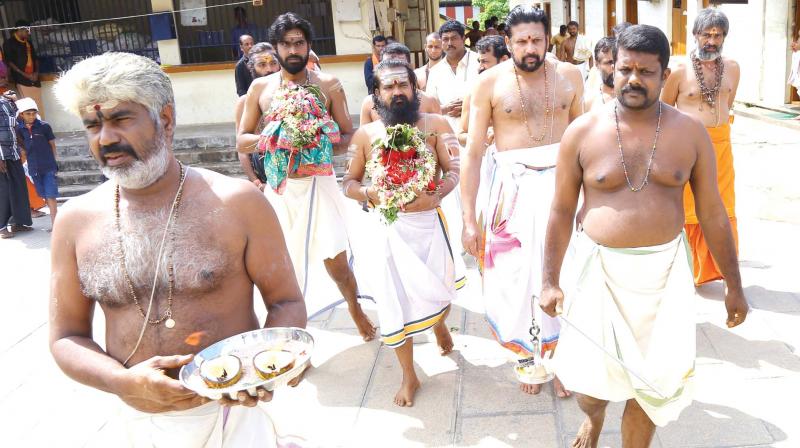The legal conundrum

Reforms in a society move a few strides forward and take giant leaps backwards. The turn of one century has brought back memories of Vaikom Satyagraha, in which the right to temple entry was raised. Leading personalities, including Mahatma Gandhi, evinced keen interest in it. One can recall a number of instances when traditions have been blown to smithereens by the whirlwinds of social change. Kings and kingdoms have vanished. Mighty nations, which appeared invincible, are no longer so. Still, if one argues that traditions cannot be changed whatsoever may be the reason, she/he needs to look at the huge dustbin of history, which still has more than enough space to accommodate those who can fill it.
The struggle for temple entry, right to education, fight against untouchability and unseeability was long and arduous and met with stiff resistance by persons who cited divine sanctions. Ultimately, change won over the status quo. Obviously, a believer has to admit that the divine is in favour of change than status quo.
In economics, a public good is defined as one which is non-rivalled and non-excludible. Devotion is perfectly in accordance with this definition. One's devotion is not in rivalry with another's and a devotee cannot be excluded from meeting God/Goddess in the form she/he desires. In a democratic society, freedom not to believe is equally relevant. Be these as it may, the Sabarimala row has raised certain pertinent questions which need answers:
1. There are demands for a law by Parliament, nullifying the Supreme Court verdict. It has been stated by an important political leader that it is possible only if the state legislature passes a resolution as required under Article 252 since Sabarimala is an inter-State matter.
Article 249 states that
"Notwithstanding anything in the foregoing provisions of this Chapter, if the Council of States (Rajya Sabha) has declared by resolution supported by not less than two- thirds of the members present and voting that it is necessary or expedient in the national interest (emphasis added) that Parliament should make laws with respect to any matter enumerated in the State List specified in the resolution, it shall be lawful for Parliament to make laws for the whole or any part of the territory of India with respect to that matter while the resolution remains in force."
Article 252 is as under:
"If it appears to the Legislatures of two or more states to be desirable that any of the matters with respect to which Parliament has no power to make laws for the states except as provided in articles 249 and 250 should be regulated in such states by Parliament by law, and if resolutions to that effect are passed by all the Houses of the Legislatures of those States, it shall be lawful for Parliament to pass an Act for regulating that matter accordingly, and any Act so passed shall apply to such States and to any other State by which it is adopted afterwards by resolution passed in that behalf by the House or, where there are two Houses, by each of the Houses of the Legislature of that State."
The questions are:
a) Does Article 252 override Article 249? On a plain reading it appears that they visualise two different contexts.
b) If it is felt that the Sabarimala issue is of national importance, can't a resolution be moved in Rajya Sabha? Then political parties would then have to take a clear stand on the issue in the discussions.
c) Is Sabarimala issue an inter-State one? The challenge in the Supreme Court was "Whether Rule 3(b) of the Kerala Hindu Places of Public Worship (Authorization of Entry) Rules, 1965 is ultra vires of the Kerala Hindu Places of Public Worship (Authorisation of Entry) Act, 1965 and, if treated to be intra vires, whether it will be violative of the provisions of Part III of the Constitution?" Inter-State matters are on the Union List but here it is a State legislation which is under challenge. Does this not make it clear that it is not an inter-State issue?
Lastly, the most important question is:
"The Chief Justice in his order held that Rule 3(b) of the 1965 Act, which prohibited women from entering Sabarimala, is ultra vires to Section 4 of the Act. Is this not a case of subordinate legislation overstepping the provisions of the statute?
If for argument's sake, it is assumed that the proviso to Section 4 which prohibits discrimination against any section or class is deleted making the subordinate legislation, that is, Rule 3(b) becoming intra vires to section 4 of the 1965 Act, the question of the latter being violative of Article 25 of the Constitution would still persist. This would require not a new law but a constitutional amendment.
Though fundamental rights are amendable, will not making an amendment prejudicial to freedom of conscience, and right to profess , practise and propagate religion for every citizen irrespective of caste and gender, alter the basic structure of the Constitution, which cannot be subject to amendments as per the judgment in Keshavananda Bharati case? Is this within legislative competence?
Besides legal questions, the political question is whether the mistake done by the Congress government in Shah Banoo case (wherein Supreme Court held that a Muslim woman separated from her husband is entitled for maintenance money and Parliament by an Act changed the law to make the judgment not operative) be repeated by this government? On the issue of passing a law, facts are being obfuscated instead of being clarified, confounding the confusion, when prima facie the sustainability of considering the legislation is doubtful. Views can differ, facts cannot.

